|
|
|
Sort Order |
|
|
|
Items / Page
|
|
|
|
|
|
|
| Srl | Item |
| 1 |
ID:
156768


|
|
|
|
|
| Summary/Abstract |
Fiscal sociology has alleged the existence of a mutually reinforcing effect between the emergence of representative government and effective taxation. This paper looks at Benin, a low-income country that successfully democratised in the early 1990s. It finds that Benin appears to have reinforced its extractive capacities since democratisation. However, the effect of democratisation has been indirect, while the influence of the International Financial Institutions (IFI) and the size of the country's informal sector have played a more direct role. Nevertheless, the hypothesis that effective taxation is based on a quasi-consensual relationship between the state and the taxpayers finds some confirmation.
|
|
|
|
|
|
|
|
|
|
|
|
|
|
|
|
| 2 |
ID:
088212
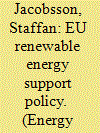

|
|
|
|
|
| Publication |
2009.
|
| Summary/Abstract |
The recent EU Commission proposal for promoting the supply of power from renewable energy sources was originally based on a pan-European, harmonised tradable green certificate (TGC) scheme. We suggest, on the basis of a multi-disciplinary analysis, that a pan-EU TGC system is not the way forward for Europe. It is vital that the Commission (and the majority of Member States) avoids implementation of such policy designs put forward by a coalition of vested interests. They should instead look at, and act upon, the available evidence from those countries that have experimented with TGCs (e.g. Flanders, UK and Sweden) and design policies that stand a better chance of meeting the criteria of effectiveness, efficiency and equity. In particular, the policies must enable EU to meet the immense innovation/industrialisation challenge by inducing the development of a capital goods industry that can, eventually, diffuse a broad range of technologies that use renewable energy sources. Only then we can acquire an ability to implement an industrial revolution in the energy system in a way that broadly meets the criteria of effectiveness and dynamic efficiency.
|
|
|
|
|
|
|
|
|
|
|
|
|
|
|
|
| 3 |
ID:
186871


|
|
|
|
|
| Summary/Abstract |
At the time of writing this Editor's Note, it has been but a few weeks since the horrifying school shooting in Uvalde, Texas on May 24, 2022, that killed 19 children and two teachers, and the supermarket massacre of ten people in Buffalo, New York ten days earlier. Both lone gunmen were 18 years old and both used legally acquired AR-15-style weapons (Edmondson 2022). The events catapulted gun control debates again into the headlines and culminated in swift legislation proposals in Congress. On June 8, 2022, a bitterly divided House—voting largely along party lines—approved a stricter gun control bill package by 223 to 204 votes but also revealed the partisan chasm that continues to afflict passing effective firearms control legislation in the United States. Among other things, the bill would ban under-21s from legally purchasing semiautomatic rifles, increase requirements for gun storage in private households, and prohibit the sale of magazines holding over 15 rounds (Edmondson 2022). The acrimonious arguments in the House were predictably partisan with Democrats focusing on protecting children from gun violence while Republicans highlighted that the proposal would violate Second Amendment rights. Representative Jim Jordan (R-OH; cited in Edmondson 2022), opined that protecting children “is important—it sure is. But this bill doesn't do it. What this bill does is take away Second Amendment rights, God-given rights, protected by our Constitution, from law-abiding American citizens.”
|
|
|
|
|
|
|
|
|
|
|
|
|
|
|
|
| 4 |
ID:
093721
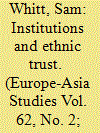

|
|
|
|
|
| Publication |
2010.
|
| Summary/Abstract |
This study considers the prospects for rebuilding trust in a multi-ethnic society with a history of ethnic violence. Findings are based on survey data from a stratified random sample of 681 Bosnian Serbs, Croats and Bosniaks, conducted between September 2003 and January 2004. The data indicate significant trust problems in Bosnian society both within and across ethnicity. However, the study also finds strong linkages between ethnic trust and trust in institutions, suggesting that institutions can play a vital role in restoring ethnic trust and promoting reconciliation.
|
|
|
|
|
|
|
|
|
|
|
|
|
|
|
|
| 5 |
ID:
191184
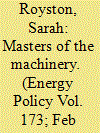

|
|
|
|
|
| Summary/Abstract |
Economic modelling plays a major role in the development, justification and evaluation of energy policies. However, there has been little investigation of how political dynamics systematically influence these models' development and outputs, or the implications for energy strategies, targets and interventions. Using in-depth interviews with 24 European modellers and policyworkers, we illuminate the politics of economic modelling within European Union (EU) energy policymaking, focusing on dynamics of contestation, differentiated influence and power relations within models' a) framing of questions and problems; b) framing of scenarios and solutions; c) structural assumptions and d) definition of quantitative data inputs. We then consider deeper questions of e) access and exclusion, showing how modelling is used to silence critical voices and reinforce incumbent interests. We argue that understanding this politics of modelling is crucial to the implementation of sustainable energy transitions. We conclude with recommendations for researchers and policyworkers seeking to promote the use of alternative/innovative models in energy policy (within and beyond the EU), centring on reflexivity; recognition; and relationship-building. Developing multi-sectoral ‘communities of practice’ around innovative modelling approaches is vital in challenging a vicious circle of evidence and policy that legitimises business-as-usual in a dangerously warming world.
|
|
|
|
|
|
|
|
|
|
|
|
|
|
|
|
| 6 |
ID:
087571
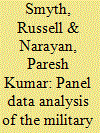

|
|
|
|
|
| Publication |
2009.
|
| Summary/Abstract |
While a number of studies examine the nexus between military expenditure and economic growth, little consideration has been give to the effect of military expenditure on external debt. This article examines the impact of military expenditure and income on external debt for a panel of six Middle Eastern countries - Oman, Syria, Yemen, Bahrain, Iran, and Jordan - over the period 1988 to 2002. The Middle East represents an interesting study of the effect of military expenditure on external debt because it has one of the highest rates of arms imports in the world and it is one of the most indebted regions in the world. The study first establishes whether there is a long-run relationship between military expenditure, income, and external debt in the six countries using a panel unit root and panel cointegration framework and then proceeds to estimate the long-run and short-run effects of military expenditure and income on external debt. The study finds that external debt is elastic with respect to military expenditure in the long run and inelastic with respect to military expenditure in the short run. For the panel of six Middle Eastern countries, in the long run a 1% increase in military expenditure results in between a 1.1 % and 1.6% increase in external debt, while a 1% increase in income reduces external debt by between 0.6% and 0.8%, depending on the specific estimator employed. In the short run, a 1% increase in military expenditure increases external debt by 0.2%, while the effect of income on external debt is statistically insignificant.
|
|
|
|
|
|
|
|
|
|
|
|
|
|
|
|
| 7 |
ID:
127054
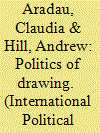

|
|
|
|
|
| Publication |
2013.
|
| Summary/Abstract |
Drawing has been largely neglected in discussions of visuality, conflict, and violence. In 2007, the International Criminal Court accepted 500 children's drawings depicting the conflict in Darfur as contextual evidence for war crime trials against Sudanese officials. Starting from this event, and the attention that the Darfuri children's drawings have garnered internationally, this article explores the role that drawings, and children's drawings in particular, play in the visualization of conflict and violence. Rather than focusing primarily on the relation between image and text, the article argues that visuality needs to be understood as both an aesthetic and social object, whose production, circulation, and reception transform its political effects. It then shows how children's drawings are both differentially produced, and productive of difference and ambivalence, in the "truthfulness" of conflict.
|
|
|
|
|
|
|
|
|
|
|
|
|
|
|
|
| 8 |
ID:
045327


|
|
|
|
|
| Publication |
London, Macmillan, 1972.
|
| Description |
x, 144p.
|
|
|
|
|
|
|
|
|
|
|
|
Copies: C:1/I:0,R:0,Q:0
Circulation
| Accession# | Call# | Current Location | Status | Policy | Location |
| 009540 | 160/AYE 009540 | Main | On Shelf | General | |
|
|
|
|
| 9 |
ID:
168809


|
|
|
|
|
| Summary/Abstract |
The dominant paradigm in scholarship on death penalty law in India is doctrinal and empirical. There is an equally indispensable need for a third approach that focuses on the rhetoric of and in death penalty judgements. In the first part of the paper I argue why such an approach is necessary, and in the second part I instantiate this by a close reading of narrative techniques and rhetorical devices deployed in two recent Supreme Court judgements. I show the use of antirrhetic speech, ekphrasis and the ‘reality effect’ woven into the narrative of the taboo on incest, peopled with characters such as ‘diabolical monsters’ plotting ‘sinister designs’. Embedded in these narratives are judges who see themselves as reconstituting a community on the verge of breakdown. In this circular operation, monsters are linguistically created, and the monstrosity of the criminal is then used as a justification for death. Yet such a monster cannot be a wholly non-human figure because intent is necessary for fixing legal responsibility.
|
|
|
|
|
|
|
|
|
|
|
|
|
|
|
|
|
|
|
|
|